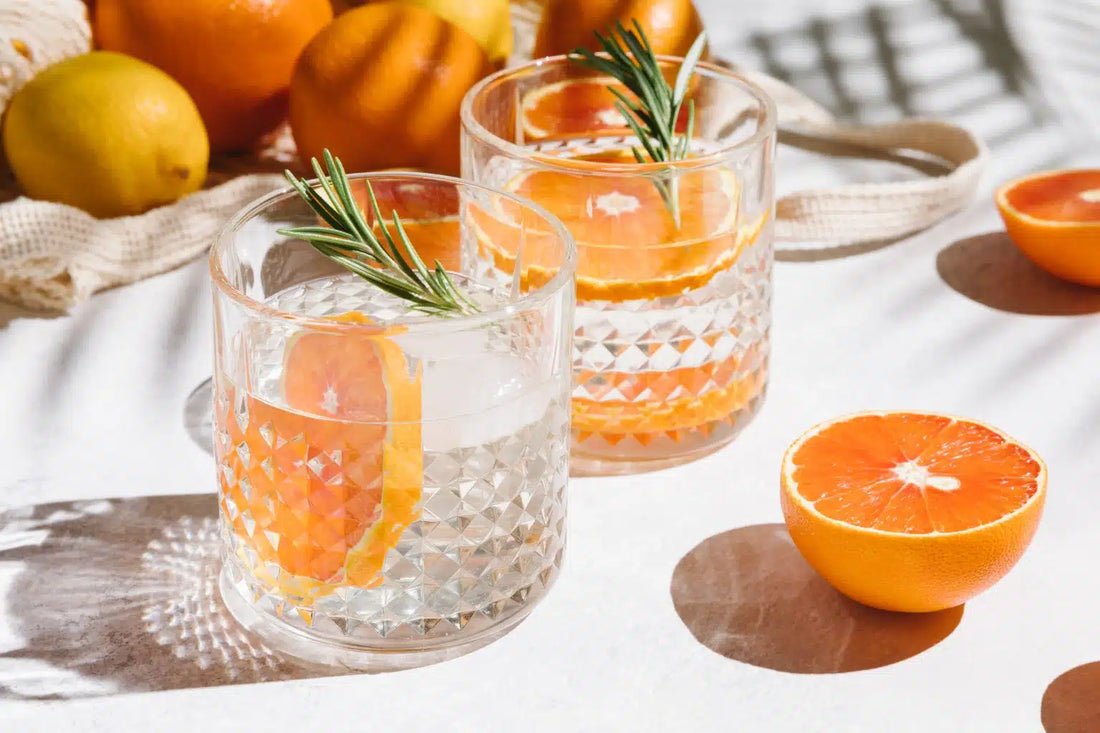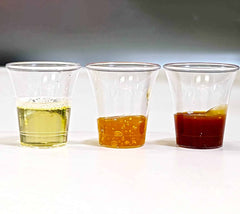ARE YOU MAKING THE MOST OF DRY JANUARY?


Are you already participating in Dry January or considering taking a break from alcohol at some point this year? Dry January and the “sober curious” movement have gained traction in recent years as consumers, most notably Gen Z, have put a stronger emphasis on their health and are drinking less than previous generations. In this blog, we’ll discuss “Dry January,” the potential health benefits of an alcohol reset, and how to make the most of your experience. Let’s dive in! (Source)
What is Dry January?
Dry January is a popular health and wellness movement that encourages people to abstain from consuming alcoholic beverages for the entire month of January. This health initiative is often embraced as a way to kickstart the New Year with a focus on physical and mental well-being. Participants voluntarily commit to cutting alcohol out of their lives for one month, with most aiming to experience health benefits such as improved sleep, increased energy levels, a better mood, and clearer skin. Many people use Dry January as a time to reassess their relationship with alcohol and establish healthier nutrition and lifestyle habits.
While alcohol is an intrinsic part of many adults’ lives, the reality is that alcohol takes a toll on our health and can have a negative impact on our lives. Here are a few ways alcohol impacts our well-being:
- Alcohol decreases sleep quality. Even if you have no issues falling asleep after drinking alcohol, it changes the structure of your sleep, making it less restorative and potentially causing you to feel groggy and tired in the morning despite getting your 7-9 hours. (Source)
- Alcohol intake can drive issues with weight management. This may happen because alcohol can impair satiety cues and lower inhibitions, causing people to eat more or eat foods they wouldn’t normally eat had they not consumed alcohol. (Source)
- Alcohol impairs estrogen metabolism; this can be especially impactful for women during perimenopause and menopause. (Source)
- Alcohol changes brain structure and function with as little as 1-2 drinks a day. It decreases white matter volume in the brain which is crucial for helping the brain process information. (Source)
- Alcohol intake may deplete beneficial gut bacteria and facilitate an overgrowth of harmful bacteria (dysbiosis). (Source)
- Alcohol can disrupt the gut lining, increasing the risk of developing a leaky gut. Leaky gut is related to autoimmune diseases and food sensitivities. (Source)
But what about the purported benefits of alcohol intake for heart health that you may have heard about in the media? Recent research refutes the long-held claim that moderate alcohol intake improves cardiovascular health, demonstrating that no level of alcohol intake confers cardiovascular health benefits. It’s a tough pill to swallow, but one that we should be aware of!(Source)
Conversely, taking a break from alcohol may help promote:
- Deeper, more restorative sleep.
- Increased energy levels
- Improved digestion by allowing the growth of beneficial gut bacteria and absorption of nutrients
- A revitalized immune system
- Higher productivity at work and in life
- A better mood
These potential health benefits are backed by science! A study performed in the UK found that people who participated in Dry January experienced improvements in sleep, concentration, blood sugar, blood pressure, and weight loss! (Source)
Beyond the physical and mental health benefits, participating in Dry January (or any break in drinking) can also help you save money – alcohol is expensive, after all! In fact, even if you only drink 2 drinks a day on the weekends, you may still be spending nearly $2,500 on alcohol annually. Ouch! (Source)
You can discover how much you’re spending on alcohol using the National Institute of Health’s alcohol cost calculator
Finally, engaging in Dry January is also an excellent way to challenge yourself and hone your willpower “muscle!”
Have you tried a Dry January yet? If you are “sober curious,” here are some tips for making the most of a Dry January or any other month in 2024!
How to Make the Most of Dry January
Here are some tips to help you maximize this health initiative!
- Be clear about your “why.”A clear “why” behind your decision to participate in Dry January, whether it’s a desire to sleep better, lose weight, or save money, will help you stay motivated and on track. Plan ahead. Take a look at your calendar and plan for situations where you know alcohol will be available. You should prepare a brief answer when curious colleagues, friends, or family members ask you why you’re not drinking. If you’re going to an event, such as a wedding, you should plan and make sure non-alcoholic beverages will be available for you to choose from. Planning will go a long way towards helping you succeed!
- Recruit a friend!Abstaining from alcohol is easier when you have a buddy to join you. Recruit a friend who is also sober-curious and embark on the journey together! You and your friend can serve as each other’s accountability buddies.
- Try an app likeSunnyside to help you stay accountable. The Sunnyside app helps you gain control over your drinking by helping you set an intention for alcohol intake each week, giving you a platform to track your drink intake, and offering text and email coaching support to help you stay on track!
- Try non-alcoholic beverage alternatives! There are many delicious options on the market today. Our favorites are Seed Lip and Kin Euphorics. You can also enjoy sparkling water such as Spindrift or your homemade sparkling water with a touch of organic fruit juice.
- Optimize your protein intake! When people remove alcohol from their diets, they often notice an increased craving for sugar. This may occur because both alcohol and sugar stimulate the dopamine pathway in the brain – this pathway is involved in craving and reward-seeking. When we remove alcohol, sugar cravings may spike as your body seeks another way to get a dopamine hit. Optimizing your protein intake will help reduce sugar cravings by increasing satiety and regulating your appetite. A good goal for most people is to eat 1 gram of protein/lb of body weight. If you have any pre-existing kidney issues, discuss your protein intake with your healthcare provider.
- Try adaptogens As you start Dry January, you may experience some fluctuations in your energy and mood. Adaptogens are botanicals that help the body adapt to stress and can bolster your energy and mood. Examples of adaptogens include Panax ginseng, Rhodiola, and Ashwagandha.
- Incorporate glutathione for detox support. Like any other toxin, alcohol must be detoxified by your liver. Alcohol detoxification depletes glutathione, your body’s master antioxidant. Supplementing with glutathione during Dry January may enhance your body’s recovery process, helping you feel reinvigorated and renewed faster. (Source)
- Recognize that a slip-up doesn’t have to end your Dry January! If you slip up and have a drink, know that you also have the power to get yourself back on track.
- Make a post-Dry January plan.As you near the end of Dry January, plan for how you will approach alcohol once your month of alcohol abstention wraps up. With a plan in place, you’ll be more likely to consume alcohol in a conscious, thoughtful way the rest of the year. For example, you may make a commitment to only consume alcohol on the weekends and to limit yourself to two drinks at a time. Once you’ve made your plan, write it out and share it with a friend for accountability support!
The Bottom Line on Dry January
Participating in a Dry January or simply planning to abstain from alcohol for a concerted period, is a wonderful way to recommit to your health and begin to create a healthier relationship with alcohol. Improved sleep, enhanced energy, clear and radiant skin, and financial savings are some potential benefits of temporarily cutting out alcohol from your life.
For most of us, alcohol will always be a part of our lives. Still, we can make our relationship with it healthier and more sustainable by “wiping the slate clean” and then thoughtfully adding alcohol back into our diets in a way that supports our health and well-being.


